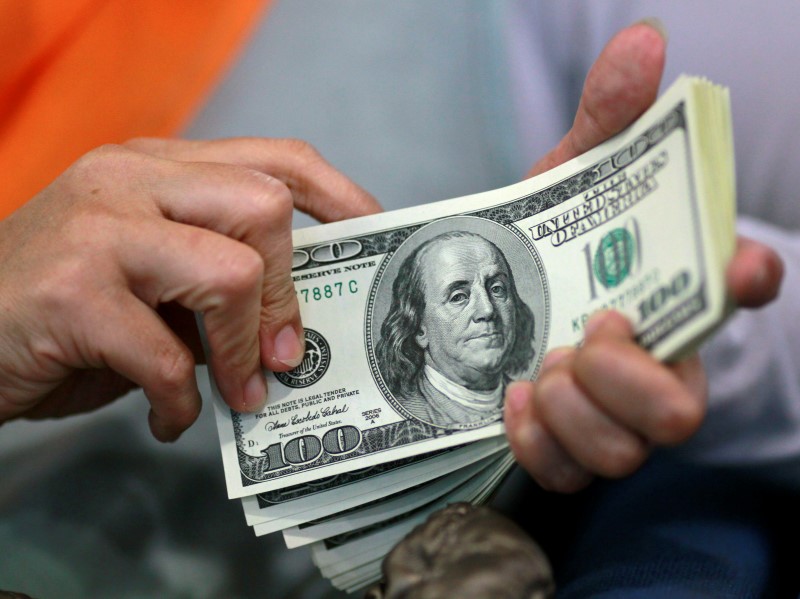By Marc Jones
LONDON (Reuters) - The dollar reached a three-month high on Friday and world shares headed for their fifth week of gains out of six, before U.S. jobs data that may nudge the Federal Reserve towards its first interest rate increase in almost a decade.
Bets on a Fed move in December are back on after the U.S. central bank's last meeting. The dollar's (DXY) strength, combined with the highest 2-year U.S. government bond yields (US2YT=RR) since 2011, showed hopes were high for the jobs numbers.
The health of U.S. employment is a key to the Fed's thinking. Economists polled by Reuters expect the data at 0830 ET to show 180,000 jobs were added last month and the overall unemployment rate remained 5.1 percent.
Investors in both Europe and Asia used the wait for the data to skim off some of the week's profits in global stock markets. MSCI's 45-country All World index (MIWD00000PUS) is at its highest since August and Wall Street is near a record high.
The S&P 500 (ESc1) and Dow Industrial (1YMc1) were expected to open lower, although the payrolls outcome may change that. Europe's main markets in London (FTSE), Frankfurt (GDAXI) and Paris (FCHI) dipped 0.1 to 0.6 percent after similar moves in Asia overnight (MIAPJ0000PUS).
"The key from the payrolls today is not only the print but also whether there is also a revision to last month's weak number," said Chris Wightman, a senior portfolio manager at Wells Fargo (N:WFC) Asset management. "And everyone is going to look whether we see below 5 percent (for overall unemployment rate)."
The main market action remained in currencies. The dollar was near $1.08
Traders and positioning data say money has piled in behind another rally for the dollar over the past two weeks. Whether it can build on a rise of more than 4 percent in the past month depends the expectations of a December rate move.
Elsewhere, Britain's sterling was close to a six-month low against the dollar and slipped against the euro, a day after it was sent tumbling when the Bank of England put off a UK rate increase.
It was last at $1.5129
"With a near-term hiking cycle off the table, the rationale for being long sterling has disappeared. We recommend turning short sterling against the dollar," said Deutsche Bank (DE:DBKGn) currency strategist Oliver Harvey.
CHINA REBOUND
Asian markets were largely subdued despite signals from Japan's central bank that it may need more stimulus if China's recent troubles hurt its economy.
"If Japanese companies hold strong concerns over the outlook due to developments in emerging economies, they may forgo capital expenditure or narrow the margin of wage hikes," BoJ Governor Haruhiko Kuroda said in a speech.
MSCI's broadest index of Asia-Pacific shares outside Japan (MIAPJ0000PUS) ended down about 0.4 percent, though it still managed a 0.8 percent weekly rise.
Japan's Nikkei (N225) closed up 0.8 percent, ending the week up almost 1 percent. The Shanghai Composite <.SSEC> extended earlier gains to climb almost 2 percent and gain 6.2 percent for the week.
In China, the securities regulator said it would allow initial public offerings to resume. They were suspended in July as regulators tried to slow a stock market crash.
"Compared to one or two months ago, people realize that the no-hard-landing scenario has become increasingly likely," said Sebastien Barbe, head of emerging markets strategy at Credit Agricole (PA:CAGR).
The stronger dollar added further pressure to crude oil futures, which were already dragged down by oversupply concerns, and to the currencies of oil-producing countries.
Russia's rouble was down 1 percent
Brent hovered at $48.50 a barrel. U.S. crude (CLc1) edged up about 0.6 percent to $45.50 a barrel, after falling over 2 percent in the previous session. It was still on track to lose 2.4 percent for the week.
Other commodities also struggled, with London copper

Spot gold